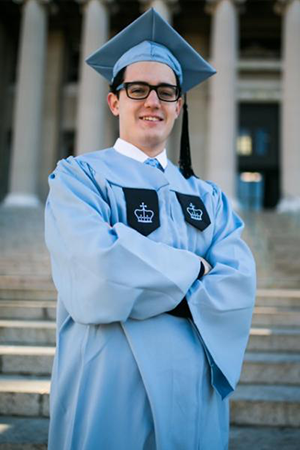Environmental Engineer Found Career Inspiration in the Weather and a Leaky Faucet

Mounir Ennenbach has been fascinated by weather since he was 12 years old, when an aunt gave him the rain gauge he used to create a small weather station in front of his home in Amman, Jordan. Now a student of earth and environmental engineering, he has been doing research on rainfall at the Columbia Water Center.
"I’m getting paid and I would have done it for free," says Ennenbach, whose research focuses on harvesting rainwater as a resource. He has worked closely with Engineering Professor Upmanu Lall, director of the Water Center, who he calls a veritable walking encyclopedia of environmental expertise.
An algorithm Ennenbach developed with Paulina Concha Larrauri, a researcher at the Water Center, improves the accuracy of rainwater collection data and won an international competition sponsored by Vaisala, a Finnish environmental services company.
Ennenbach also was part of a group that won an urban design challenge, cosponsored by the Engineering School and the Columbia Global Center in Rio de Janeiro with a project aimed at improving wastewater treatment processes in Rio’s Guanabara Bay.
"SEAS [the School of Engineering and Applied Science] gave me the practical technical skills I was looking for—scientific concepts with practical applications," says Ennenbach, who will receive a Bachelor of Engineering degree on May 18.
He came to Columbia as a pre-med major, but a leaky showerhead in his freshman dorm helped him realize his passions lay elsewhere. To see how much water was being wasted, he measured how long it took to fill a plastic water bottle. He calculated that the single showerhead was wasting as much as 140 liters a day, far more than the average person’s total daily consumption of water in Jordan, where he grew up with an American father and a Lebanese-American mother.
Ennenbach’s other passion is music. He began studying piano at age 6, and before coming to Columbia earned the equivalent of a bachelor’s degree in music performance from the Royal Schools of Music in London. Since arriving in New York, he has taken part in Columbia’s Music Performance Program, appearing with a Columbia chamber music group at Carnegie Hall.
He considered a career in music, Ennenbach says, but was interested in so many other things, especially science. He should have known he would be an engineer, he says. As a teenager at the prestigious Interlochen music camp in Michigan, he put together piano benches while also practicing piano six or seven hours a day. But music will always be an important part of his life, he says.
"Everything is at your fingertips in New York," he says. He has taken advantage of $10 student tickets to performances at Alice Tully Hall and visited the city’s many international neighborhoods, such as Flushing and Jackson Heights in Queens, and Williamsburg in Brooklyn. "Multiculturalism definitely exists in New York," he says. "It’s a privilege you don’t have anywhere else."
After graduation, Ennenbach heads first to Rio and then to Finland to collect his prizes, including €20,000 from Vaisala that he will share with Larrauri. When he returns to New York, he’ll put his engineering skills to work with Citigroup’s environmental risk management team, researching potential environmental hazards in projects the bank invests in and working with clients to mitigate that risk. He is interested in applying computer concepts to environmental engineering and may later go to graduate school for computer science.
Weather is still an obsession, Ennenbach says, and he checks weather reports as often as six times a day. "Sometimes your nerdy hobbies pay off," he says.